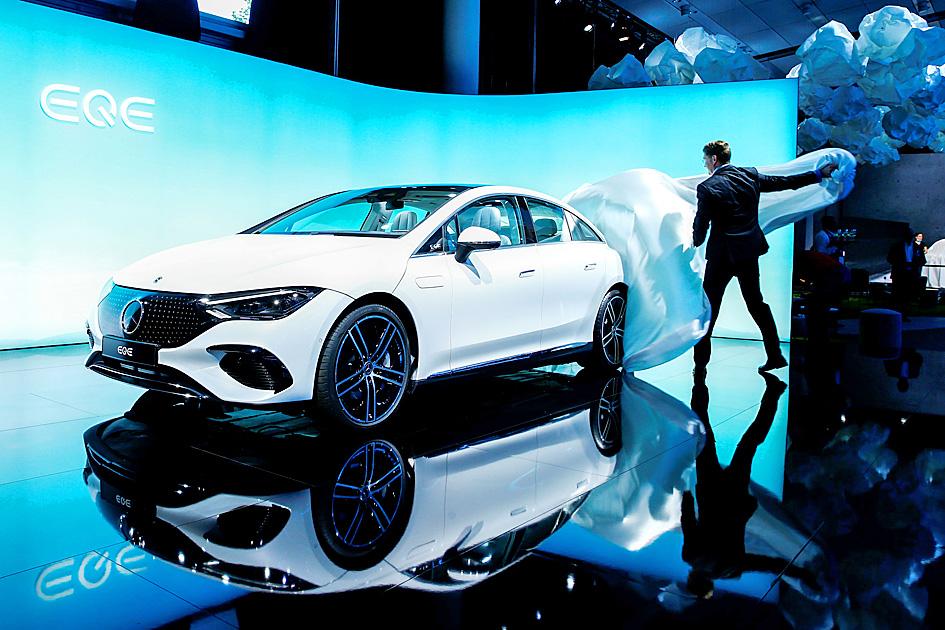Auto sales are deteriorating in Europe, with months of meek recovery giving way to deliveries that no longer even measure up to last year’s pandemic-depressed results.
New vehicle registrations fell 18 percent last month and 24 percent in July from a year earlier, the European Automobile Manufacturers’ Association said yesterday.
Sales are up just 13 percent for the year, less than half the percentage increase posted at the year’s halfway point.

Photo: Reuters
SCARCE INVENTORY
Auto production is being suppressed by a global semiconductor shortage that the chief executives of Volkswagen AG, Daimler AG and BMW AG have said would linger well into next year.
If scarce inventory were not enough to drive up prices, automakers are also prioritizing their most lucrative models as the number of vehicles they can produce is constrained.
“The chip shortage is causing production losses, and demand that’s actually high can’t be met,” EY said in a note. “Traditional combustion vehicles have been hit the most, while the boom for plug-in hybrids and electric cars continues.”
The July and August figures are the worst for the two months since the tail end of the eurozone economic crisis in 2013. The declines were broad-based, with Europe’s biggest auto markets — Germany, France, the UK, Italy and Spain — all seeing double-digit drops each month.
So far, automakers have been holding up just fine. First-half earnings, margins and cash flows were the highest in the industry’s history, Bernstein analyst Arndt Ellinghorst said in a report on Wednesday.
“Isn’t autos a funny industry,” he wrote. “The fewer cars OEMs sell, the more money they make.”
Europe’s biggest economies might be having a harder time. Supply crunches are hitting Germany beyond just the automotive sector and threatening to derail its recovery.
Of Europe’s five big markets, Spain performed worst last month, with sales plunging 29 percent, followed by Italy with a 27 percent drop.
LINGERING UNCERTAINTY
Uncertainty related to the COVID-19 pandemic likely added to problems caused by the chip shortage, RBC Capital markets analyst Joe Spak wrote in a report earlier this month.
Among the largest automakers, European sales fell 14 percent for Volkswagen Group, 29 percent for Stellantis NV and 23 percent for Renault SA last month. Registrations dropped 38 percent for Daimler AG and 18 percent for BMW AG.
“While the pandemic is not over in the region, the single biggest challenge facing the industry is now the auto chip shortage,” LMC Automotive analysts wrote in a report last week. “Any meaningful recovery in demand, following the improved economic backdrop in the region, is now being held back.”

In Italy’s storied gold-making hubs, jewelers are reworking their designs to trim gold content as they race to blunt the effect of record prices and appeal to shoppers watching their budgets. Gold prices hit a record high on Thursday, surging near US$5,600 an ounce, more than double a year ago as geopolitical concerns and jitters over trade pushed investors toward the safe-haven asset. The rally is putting undue pressure on small artisans as they face mounting demands from customers, including international brands, to produce cheaper items, from signature pieces to wedding rings, according to interviews with four independent jewelers in Italy’s main

Japanese Prime Minister Sanae Takaichi has talked up the benefits of a weaker yen in a campaign speech, adopting a tone at odds with her finance ministry, which has refused to rule out any options to counter excessive foreign exchange volatility. Takaichi later softened her stance, saying she did not have a preference for the yen’s direction. “People say the weak yen is bad right now, but for export industries, it’s a major opportunity,” Takaichi said on Saturday at a rally for Liberal Democratic Party candidate Daishiro Yamagiwa in Kanagawa Prefecture ahead of a snap election on Sunday. “Whether it’s selling food or

CONCERNS: Tech companies investing in AI businesses that purchase their products have raised questions among investors that they are artificially propping up demand Nvidia Corp chief executive officer Jensen Huang (黃仁勳) on Saturday said that the company would be participating in OpenAI’s latest funding round, describing it as potentially “the largest investment we’ve ever made.” “We will invest a great deal of money,” Huang told reporters while visiting Taipei. “I believe in OpenAI. The work that they do is incredible. They’re one of the most consequential companies of our time.” Huang did not say exactly how much Nvidia might contribute, but described the investment as “huge.” “Let Sam announce how much he’s going to raise — it’s for him to decide,” Huang said, referring to OpenAI

The global server market is expected to grow 12.8 percent annually this year, with artificial intelligence (AI) servers projected to account for 16.5 percent, driven by continued investment in AI infrastructure by major cloud service providers (CSPs), market researcher TrendForce Corp (集邦科技) said yesterday. Global AI server shipments this year are expected to increase 28 percent year-on-year to more than 2.7 million units, driven by sustained demand from CSPs and government sovereign cloud projects, TrendForce analyst Frank Kung (龔明德) told the Taipei Times. Demand for GPU-based AI servers, including Nvidia Corp’s GB and Vera Rubin rack systems, is expected to remain high,